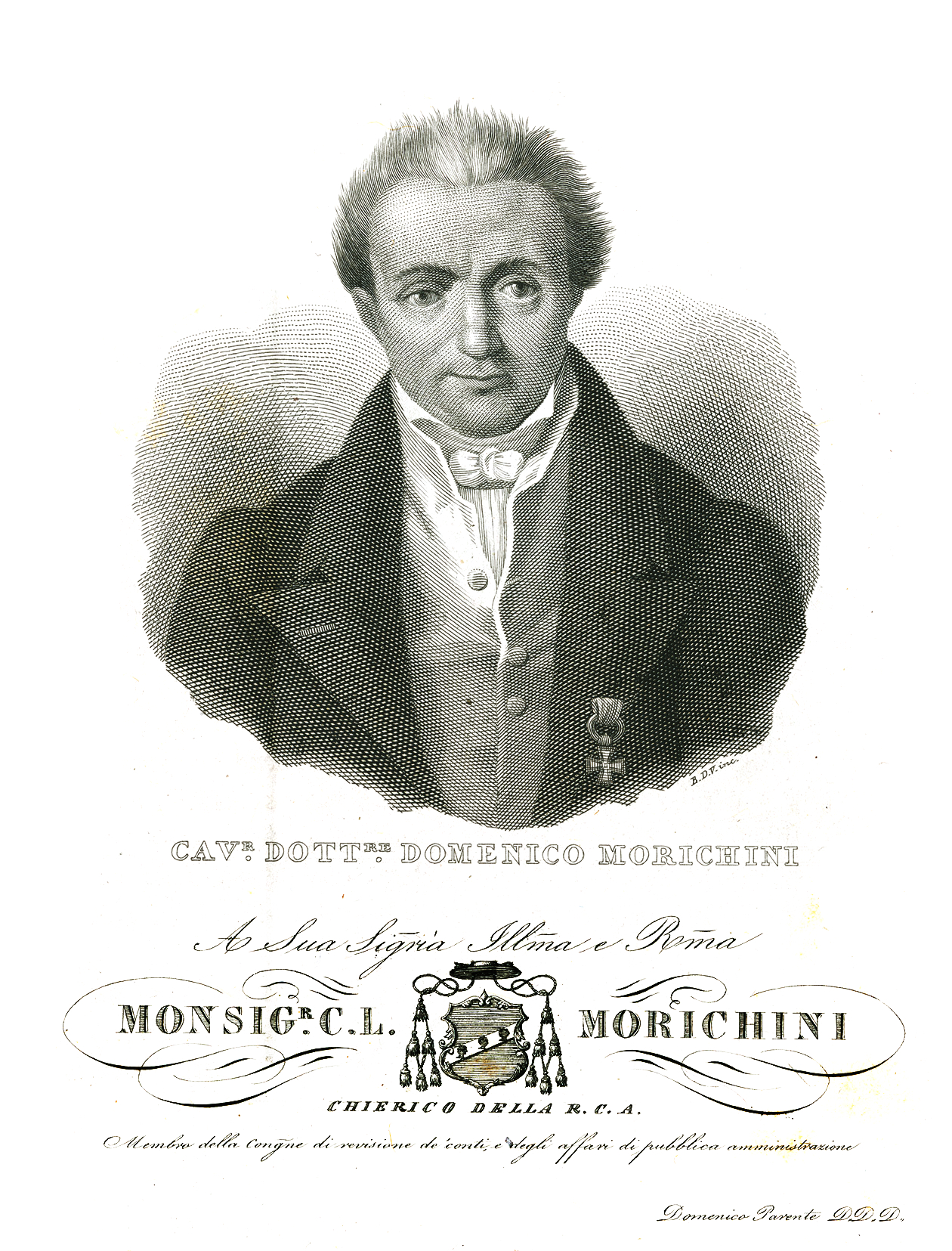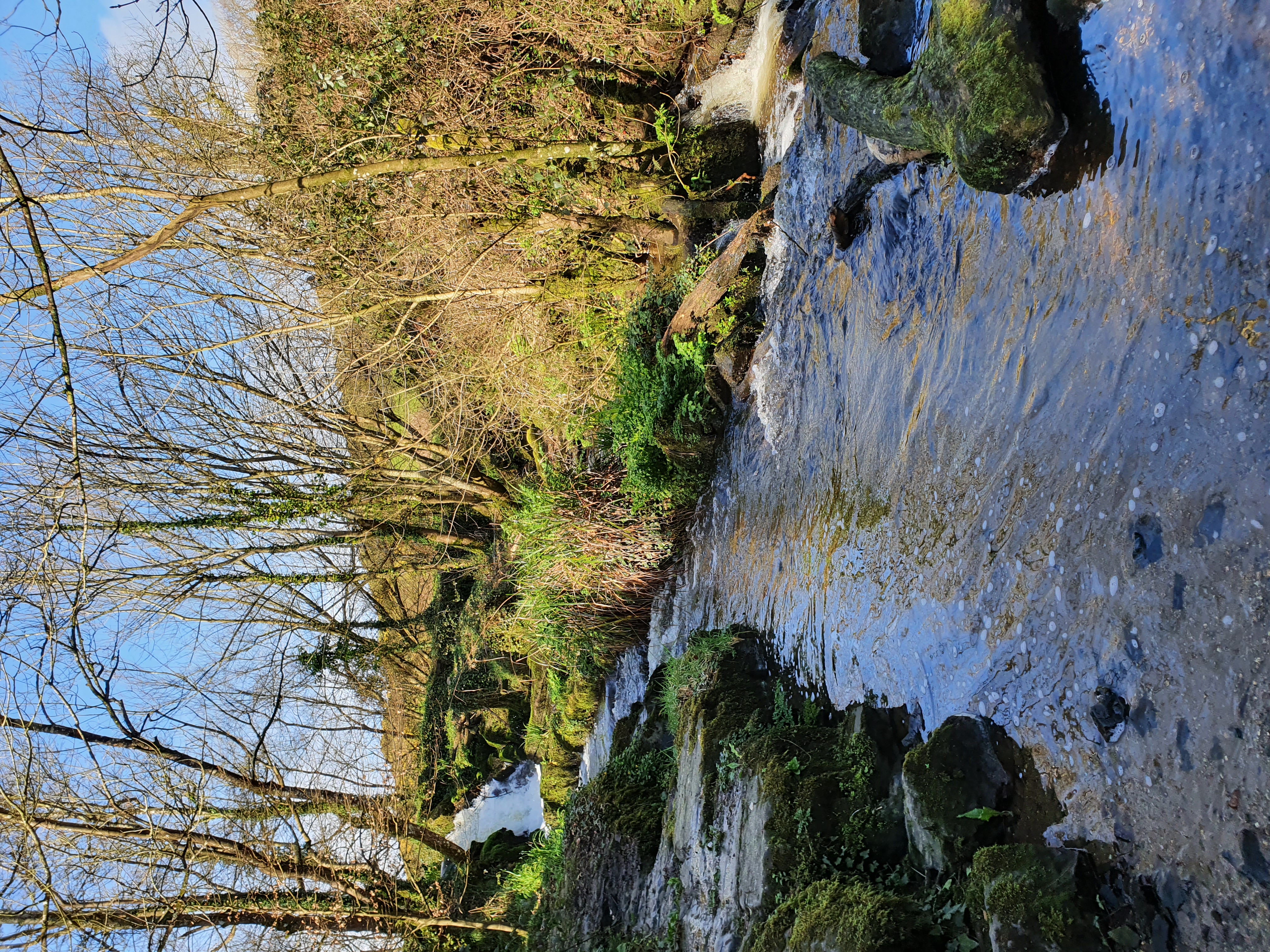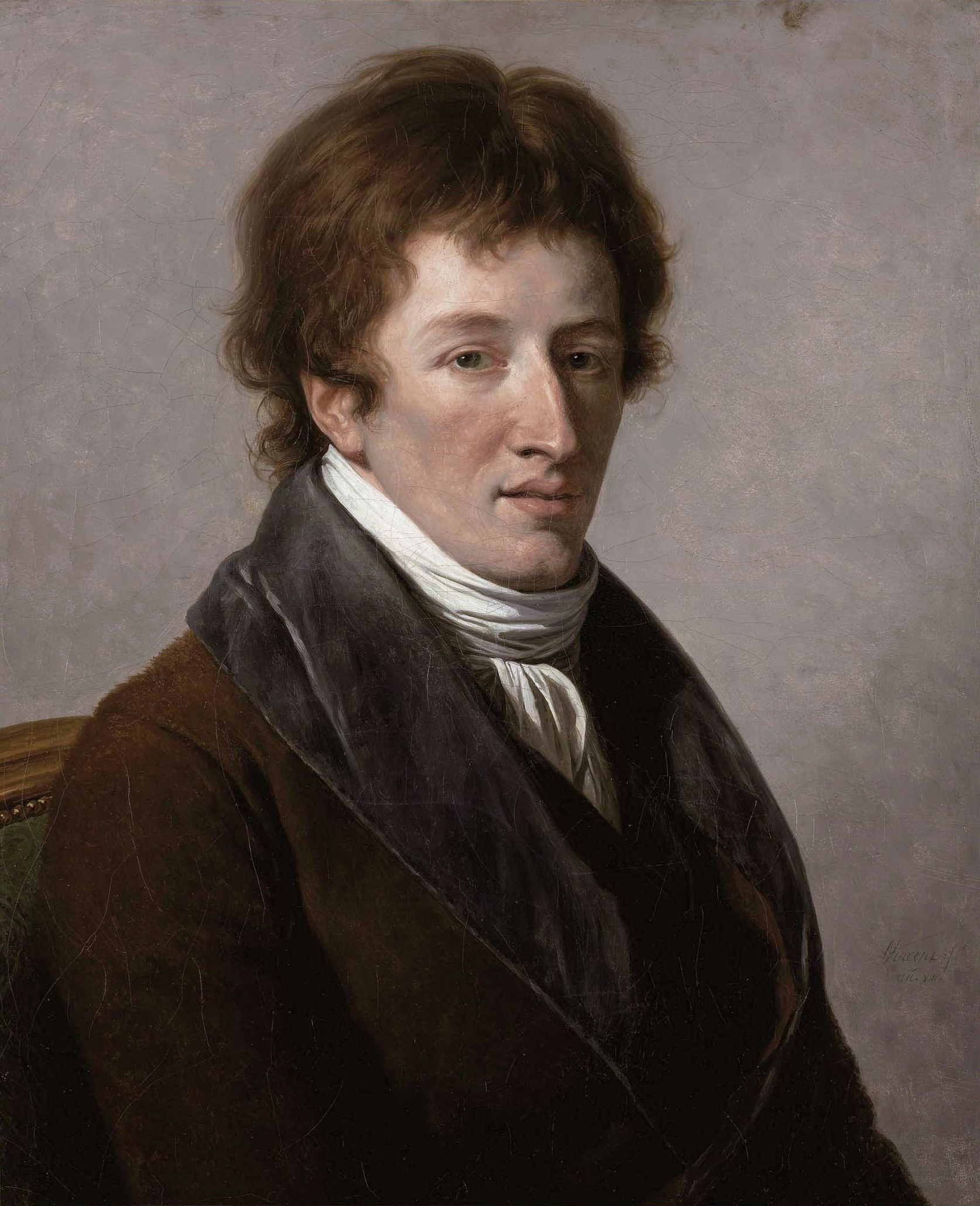|
Domenico Lino Morichini
Domenico Lino Morichini (23 September 1773 – 19 November 1836) was an Italian physician and chemist. He was the first to identify fluorine in teeth, first in a fossilized elephant tooth and then in human teeth. He also reported the magnetisation of steel by light rays which stimulated experimental approaches. Life and work Morichini was born in Civita d'Antino, L'Aquila, to farmer Anselmo and Domitilla Moratti. Educated in Sora and later Rome, he received a medical degree in 1792 and became physician, working at the hospital of Santo Spirito. He worked on public health and gave lectures on chemistry at the University of Rome. He promoted Lavoisier's ideas on combustion and oxygen rather than follow the older phlogiston theory. He rose in power in the new Roman Republic of 1798. The republic fell in 1799 and he was readmitted by Pope Pius VII as professor at the University of Sapienza where he served until 1833. In 1802 he examined fossil teeth of and elephant and demonstra ... [...More Info...] [...Related Items...] OR: [Wikipedia] [Google] [Baidu] |
Civita D'Antino
Civita d'Antino () is a ''comune'' and town in the province of L'Aquila, in the Abruzzo region of Central Italy. History ''Antinum'' was a city of the Marsi: it is mentioned in ancient sources only by Pliny, who enumerates Antinum among the cities of the Marsi. The numerous inscriptions that have been discovered in the modern village suggest that it must have been a municipal town of considerable importance. Besides these, there remain several portions of the ancient walls, of polygonal construction, with a gateway of the same style, which still serves for an entrance to the modern village, and is called Porta Campanile. The Roman inscriptions confirm the testimony of Pliny as to the city being a Marsic one (one of them has ''populi Antinatium Marsorum''); but an Oscan inscription which has been found there is in the Volscian dialect, and renders it probable that the city was at an earlier period occupied by that people. It has been supposed by some writers to be the ''castellum ... [...More Info...] [...Related Items...] OR: [Wikipedia] [Google] [Baidu] |
Sora, Lazio
Sora () is a town and ''comune'' of Lazio, Italy, in the province of Frosinone. It is built in a plain on the bank (geography), banks of the Liri. This part of the valley is the seat of some important manufacturing, especially of paper mills. The area around Sora is famous for the costumes of its peasants. History Sora, an ancient Volscian town, was thrice captured by the Roman Republic, Romans, in 345, 314, and 305 BCE, before they managed, in 303, by means of a colony 4,000 strong, to confirm its annexation as a Latin colony. In 209, it was one of the colonies that refused further contributions to the war against Hannibal. By the ''lex Julia'', it became a municipium, but under Augustus, it was colonized by soldiers of the legio IV Sorana, which had been mainly enrolled there. It belonged technically to ''Latium adiectum''. Located in the ''Ducatus Romanus'' under the authority of the pope during the early Dark Ages (historiography), Dark Ages, it was captured by the Lomb ... [...More Info...] [...Related Items...] OR: [Wikipedia] [Google] [Baidu] |
Rome
Rome (Italian language, Italian and , ) is the capital city and most populated (municipality) of Italy. It is also the administrative centre of the Lazio Regions of Italy, region and of the Metropolitan City of Rome. A special named with 2,746,984 residents in , Rome is the list of cities in the European Union by population within city limits, third most populous city in the European Union by population within city limits. The Metropolitan City of Rome Capital, with a population of 4,223,885 residents, is the most populous metropolitan cities of Italy, metropolitan city in Italy. Rome metropolitan area, Its metropolitan area is the third-most populous within Italy. Rome is located in the central-western portion of the Italian Peninsula, within Lazio (Latium), along the shores of the Tiber Valley. Vatican City (the smallest country in the world and headquarters of the worldwide Catholic Church under the governance of the Holy See) is an independent country inside the city boun ... [...More Info...] [...Related Items...] OR: [Wikipedia] [Google] [Baidu] |
Roman Republic (18th Century)
The Roman Republic ( ) was the era of classical Roman civilisation beginning with the overthrow of the Roman Kingdom (traditionally dated to 509 BC) and ending in 27 BC with the establishment of the Roman Empire following the War of Actium. During this period, Rome's control expanded from the city's immediate surroundings to hegemony over the entire Mediterranean world. Roman society at the time was primarily a cultural mix of Latin and Etruscan societies, as well as of Sabine, Oscan, and Greek cultural elements, which is especially visible in the Ancient Roman religion and its pantheon. Its political organisation developed at around the same time as direct democracy in Ancient Greece, with collective and annual magistracies, overseen by a senate. There were annual elections, but the republican system was an elective oligarchy, not a democracy; a small number of powerful families largely monopolised the magistracies. Roman institutions underwent considerable c ... [...More Info...] [...Related Items...] OR: [Wikipedia] [Google] [Baidu] |
Pope Pius VII
Pope Pius VII (; born Barnaba Niccolò Maria Luigi Chiaramonti; 14 August 1742 – 20 August 1823) was head of the Catholic Church from 14 March 1800 to his death in August 1823. He ruled the Papal States from June 1800 to 17 May 1809 and again from 1814 to his death. Chiaramonti was also a monk of the Order of Saint Benedict in addition to being a well-known theologian and bishop. Chiaramonti was made Bishop of Tivoli in 1782, and resigned that position upon his appointment as Bishop of Imola in 1785. That same year, he was made a cardinal. In 1789, the French Revolution took place, and as a result a series of anti-clerical governments came into power in the country. In 1798, during the French Revolutionary Wars, French troops under Louis-Alexandre Berthier invaded Rome and captured Pope Pius VI, taking him as a prisoner to France, where he died in 1799. The following year, after a ''sede vacante'' period lasting approximately six months, Chiaramonti was elected to the papac ... [...More Info...] [...Related Items...] OR: [Wikipedia] [Google] [Baidu] |
Sapienza University Of Rome
The Sapienza University of Rome (), formally the Università degli Studi di Roma "La Sapienza", abbreviated simply as Sapienza ('Wisdom'), is a Public university, public research university located in Rome, Italy. It was founded in 1303 and is as such one of the world's oldest universities, and with 122,000 students, it is the List of largest universities by enrollment, largest university in Europe. Due to its size, funding, and numerous laboratories and libraries, Sapienza is a global major education and research centre. The university is located mainly in the ''Città Universitaria'' (University city), which covers near the monumental cemetery Campo Verano, with different campuses, libraries and laboratories in various locations in Rome. For the 14th year in a row it is ranked 1st university in Italy and in Southern Europe according tCWUR Sapienza was founded on 20 April 1303 by decree from Pope Boniface VIII as a ''Studium'' for ecclesiastical studies under more control than ... [...More Info...] [...Related Items...] OR: [Wikipedia] [Google] [Baidu] |
Humphry Davy
Sir Humphry Davy, 1st Baronet (17 December 177829 May 1829) was a British chemist and inventor who invented the Davy lamp and a very early form of arc lamp. He is also remembered for isolating, by using electricity, several Chemical element, elements for the first time: potassium and sodium in 1807 and calcium, strontium, barium, magnesium and boron the following year, as well as for discovering the elemental nature of chlorine and iodine. Davy also studied the forces involved in these separations, inventing the new field of electrochemistry. Davy is also credited with discovering clathrate hydrates. In 1799, he experimented with nitrous oxide and was astonished at how it made him laugh. He nicknamed it "laughing gas" and wrote about its potential as an Anesthesia, anaesthetic to relieve pain during surgery. Davy was a baronet, President of the Royal Society (PRS), Member of the Royal Irish Academy (MRIA), a founder member and Fellow of the Geological Society of London, and a ... [...More Info...] [...Related Items...] OR: [Wikipedia] [Google] [Baidu] |
Georges Cuvier
Jean Léopold Nicolas Frédéric, baron Cuvier (23 August 1769 – 13 May 1832), known as Georges Cuvier (; ), was a French natural history, naturalist and zoology, zoologist, sometimes referred to as the "founding father of paleontology". Cuvier was a major figure in natural sciences research in the early 19th century and was instrumental in establishing the fields of comparative anatomy and paleontology through his work in comparing living animals with fossils. Cuvier's work is considered the foundation of vertebrate paleontology, and he expanded Linnaean taxonomy by grouping classes into phylum, phyla and incorporating both fossils and living species into the classification. Cuvier is also known for establishing extinction as a fact—at the time, extinction was considered by many of Cuvier's contemporaries to be merely controversial speculation. In his ''Essay on the Theory of the Earth'' (1813) Cuvier proposed that now-extinct species had been wiped out by periodic catastr ... [...More Info...] [...Related Items...] OR: [Wikipedia] [Google] [Baidu] |
Andreas Von Baumgartner
Andreas () is a name derived from the Greek noun ἀνήρ ''anēr'', with genitive ἀνδρός ''andros'', which means "man". See the article on Andrew for more information. The Scandinavian name is earliest attested as antreos in a runestone from the 12th century. The name Andrea may be used as a feminine form, but it is also the main masculine form in Italy and the canton of Ticino in Switzerland. Given name Andreas is a common name, and this is not a comprehensive list of articles on people named Andreas. See instead . Surname * Alfred T. Andreas (1939–1900), American publisher and historian * Casper Andreas (born 1972), American actor and film director * Dwayne Andreas (1918–2016), American businessman * Harry Andreas (1879–1955), Australian businessman and company director * Lisa Andreas (born 1987), English singer Places *Andreas, Isle of Man, a village and parish in the Isle of Man See also * San Andreas (other) References * – Dictionary of ... [...More Info...] [...Related Items...] OR: [Wikipedia] [Google] [Baidu] |
Mary Somerville
Mary Somerville ( ; , formerly Greig; 26 December 1780 – 29 November 1872) was a Scottish scientist, writer, and polymath. She studied mathematics and astronomy, and in 1835 she and Caroline Herschel were elected as the first female Honorary Members of the Royal Astronomical Society. When John Stuart Mill organized a massive petition to Parliament to give women the right to vote, he made sure that the first signature on the petition would be Somerville's. When she died in 1872, '' The Morning Post'' declared in her obituary that "Whatever difficulty we might experience in the middle of the nineteenth century in choosing a king of science, there could be no question whatever as to the queen of science". One of the earliest uses of the word scientist was in a review by William Whewell of Somerville's second book ''On the Connexion of the Physical Sciences''. However, the word was not used to describe Somerville herself; she was known and celebrated as a mathematician or a phi ... [...More Info...] [...Related Items...] OR: [Wikipedia] [Google] [Baidu] |
Carlo Luigi Morichini
Carlo Luigi Morichini (1805–1879) was a Roman Cardinal. Born on 21 November 1805 in Rome,Bräuer, p. 49. he was the son of the noted Roman physician Domenico Lino Morichini (1773–1837). He studied philosophy and law for seven years (1822–1818) at the University of Rome, La Sapienza, and was awarded the degree '' Doctor in utroque iure''. He was later awarded a doctorate in theology. He was ordained a priest on 20 December 1828. Early employment He obtained a position as secretary to the Auditor of the Sacred Roman Rota, Msgr. Pietro Marini. Morichini was Vice-President of the ''Ospizio apostolico di S. Michele'' in Rome. In 1833 he was appointed Referendary of the Tribunal of the Two Signatures. He also became an official (''ponente'') of the Sacred Congregation on Good Government. Diplomat and government minister In 1845 he was appointed Apostolic Nuncio to Bavaria with residence in Munich, and titular Latin archbishop of Nisibis by Pope Gregory XVI. His appointment ... [...More Info...] [...Related Items...] OR: [Wikipedia] [Google] [Baidu] |






